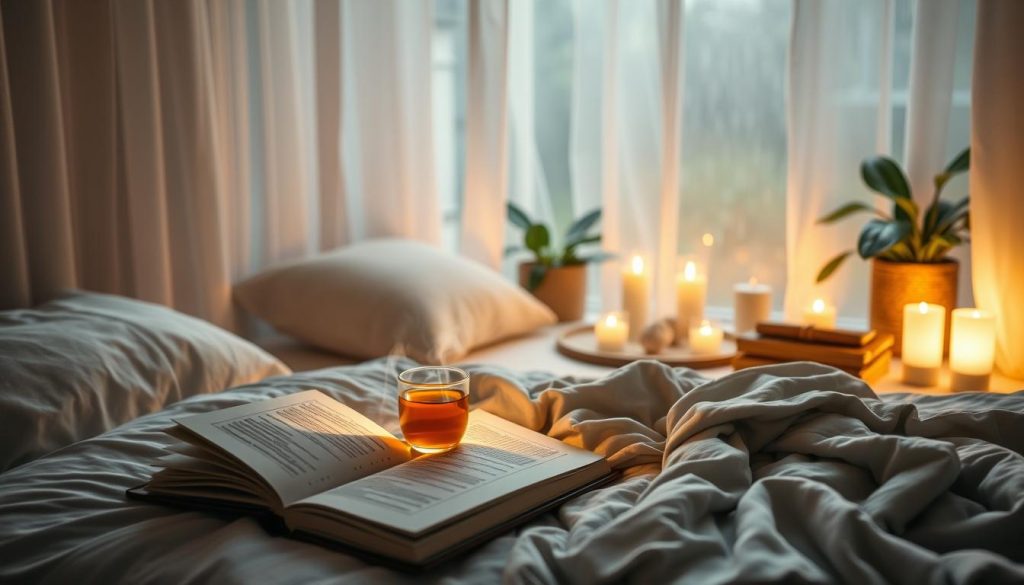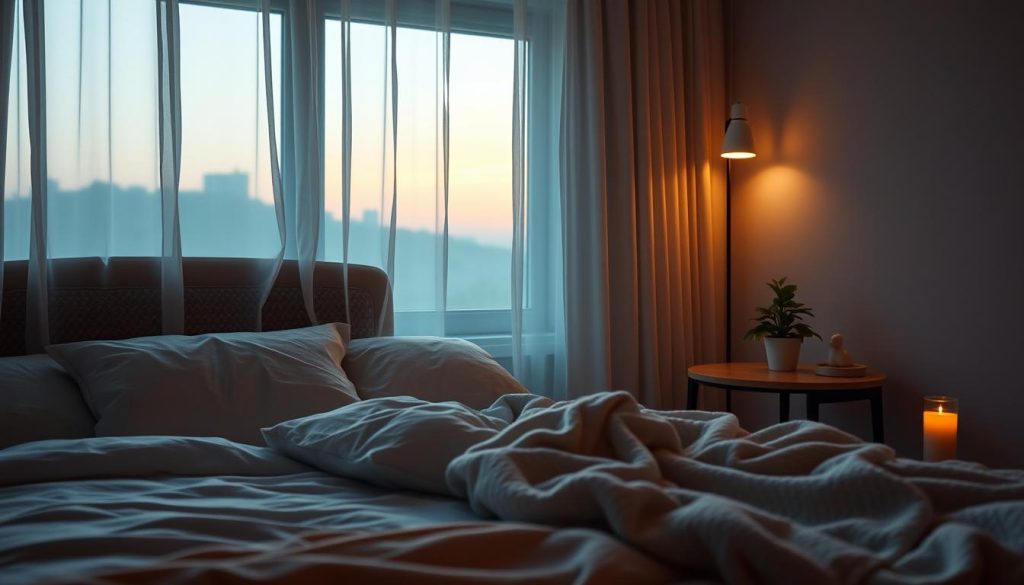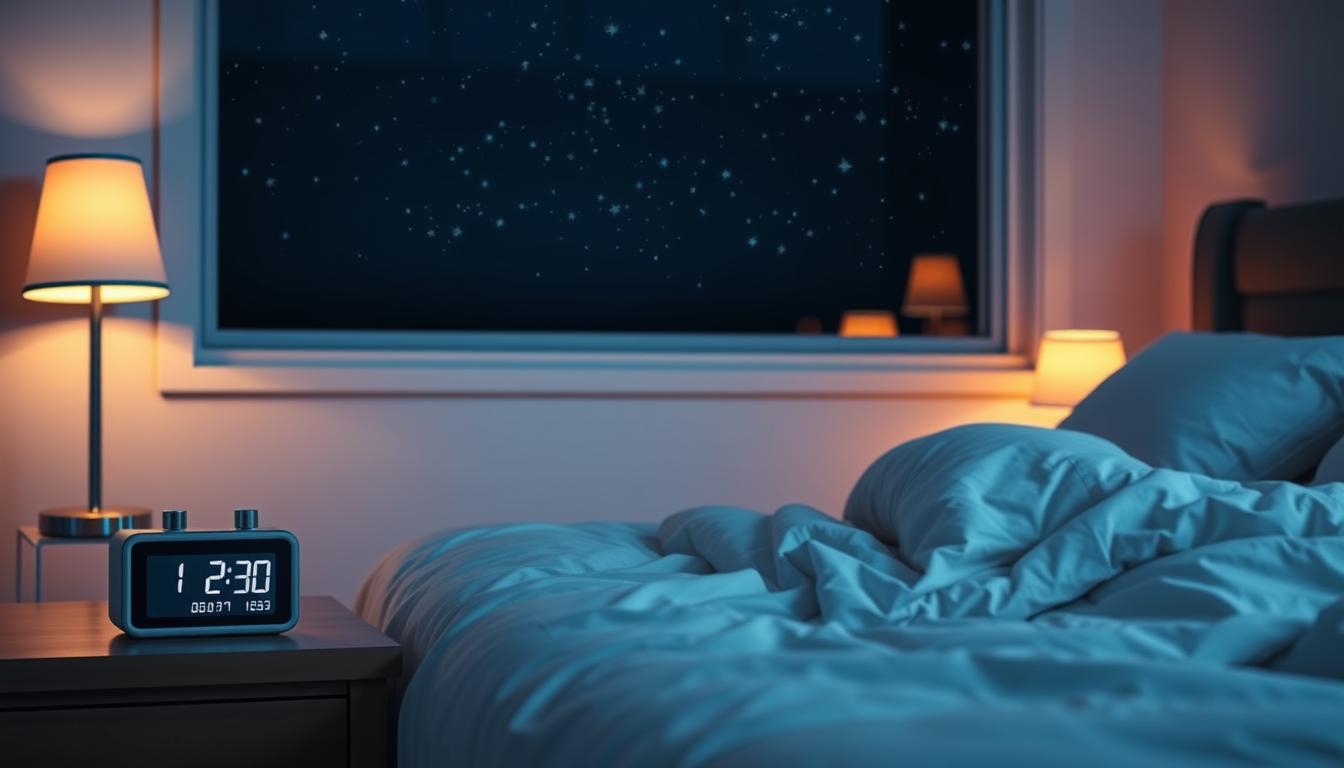Quality sleep is key for our health and happiness. But many of us find it hard to stick to a sleep schedule. Whether it’s work hours, stress, or bad habits, better sleep hygiene can change your life. We’ll share expert tips to help you improve your sleep and get the rest you need.
We’ll talk about the importance of a regular routine. We’ll also cover how to make your sleep space better and use relaxation techniques. By changing your daily habits a little, you can control your sleep. This can boost your energy, productivity, and health.
The Importance of a Consistent Sleep Schedule
Having a regular sleep schedule is key for keeping your body’s natural clock in sync. This clock controls when you sleep and wake, how hormones work, and digestion. Sticking to a routine helps your body work its best.
Why Routine Matters for Your Body Clock
Our body’s clock listens to things like sunlight and temperature. It helps us know when to sleep and when to be awake. A regular sleep schedule tells our body when to relax and when to be active. This makes our sleep better and improves our health.
The Impact of Irregular Sleep on Health and Productivity
But, not sleeping the same every night can mess with our body’s clock. It can lead to health problems like obesity and heart disease. It also makes it hard to focus and think clearly.
| Consistent Sleep Schedule | Irregular Sleep |
|---|---|
| Supports natural circadian rhythm | Disrupts body clock |
| Promotes better sleep quality | Increases risk of health issues |
| Enhances cognitive performance | Impairs productivity and focus |
By making sleep a priority, we keep our body’s clock healthy. This leads to better sleep and boosts our health and productivity. Knowing how important routine is for our body’s rhythm is the first step to better sleep and well-being.

Creating a Sleep-Friendly Environment
The place where we sleep greatly affects how well we rest. By making our sleep area cozy, we can sleep better. Let’s look at some tips to make your bedroom a place for great sleep.
Keeping the room at the right temperature is key. The best temperature for sleep is between 65°F and 70°F. This helps your body stay cool and sleep deeper.
Lighting is also important for a good sleep space. Bright lights, especially from screens, can mess with your sleep. Use dark curtains and soft, warm lamps for nighttime.
Quiet is crucial for a good night’s sleep. Use earplugs, a white noise machine, or a fan to block out noise. Try to pick a quiet spot for your bedroom.
Lastly, your bed and bedding should be comfy. A good mattress, pillows, and breathable bedding help you sleep better. They make your sleep more restful and refreshing.
By improving your sleep space, you can sleep better. Simple changes can greatly improve your sleep and health.
Establishing a Wind-Down Routine
Creating a wind-down routine before bed can change your sleep for the better. Adding relaxing activities to your evening can get your body and mind ready for sleep. Let’s look at some ways to wind down and get ready for a good night’s sleep.
Relaxing Activities to Promote Better Sleep
Doing calming activities tells your body it’s time to relax. Try these in your evening routine:
- Gentle stretching or light yoga poses to release tension in the body
- Reading a book or listening to soft, instrumental music to calm the mind
- Taking a warm bath or shower to help lower your body temperature
- Practicing deep breathing exercises or meditation to reduce stress and anxiety
- Limiting screen time and avoiding bright lights to promote melatonin production
Doing these activities regularly helps your body learn to sleep better. It makes falling asleep easier.
| Activity | Benefits for Sleep |
|---|---|
| Gentle Stretching | Releases muscle tension and promotes physical relaxation |
| Reading a Book | Calms the mind and encourages drowsiness |
| Warm Bath | Helps lower body temperature, a natural signal for sleep |
| Meditation | Reduces stress and anxiety, allowing for better sleep quality |
| Limiting Screen Time | Minimizes exposure to blue light, which can disrupt circadian rhythms |
Adding a wind-down routine and relaxing activities to your evening can greatly improve your sleep. Taking time to relax and calm your mind and body helps you sleep better. This makes your nights more restful and restorative.

Managing Stress and Anxiety for Better Sleep
Stress and anxiety can make it hard to sleep well. But, we can use some good strategies to handle these issues. This can help us sleep better.
Mindfulness and Relaxation Techniques
Mindfulness is a strong tool against stress and anxiety. It helps us focus on now and find calm inside. This makes it easier to sleep well.
- Try mindfulness meditation, deep breathing, or body scans to calm your mind and body.
- Add relaxing activities like yoga, stretching, or progressive muscle relaxation to your evening routine.
- Use calming scents like lavender or chamomile to relax your senses and help you sleep.
| Relaxation Technique | Benefits for Sleep |
|---|---|
| Mindfulness Meditation | Reduces stress and anxiety, promotes mental calm |
| Deep Breathing Exercises | Lowers heart rate and blood pressure, induces relaxation |
| Yoga and Stretching | Releases muscle tension, improves sleep quality |
| Aromatherapy | Provides a soothing, calming effect on the senses |
By adding these mindfulness and relaxation methods to our daily lives, we can better handle stress and anxiety. This leads to better sleep and feeling refreshed.

The Role of Diet and Exercise in Sleep Quality
Our diet and exercise routines are key to a good night’s sleep. What we eat and how much we move can affect our sleep quality. Making smart choices in these areas helps our body sleep better.
Nutrition Tips for Restful Nights
Some foods help us sleep better. Foods like turkey, eggs, and nuts boost serotonin and melatonin. These are important for sleep. Also, eating whole grains gives us energy for deeper sleep.
Drinking water and avoiding caffeine and alcohol at night also helps. This improves how well we sleep.
Exercise is good for sleep too. It reduces stress and improves our overall health. But, don’t work out too close to bedtime. It can make it hard to fall asleep. Instead, do a mix of activities like running, lifting, and yoga.

